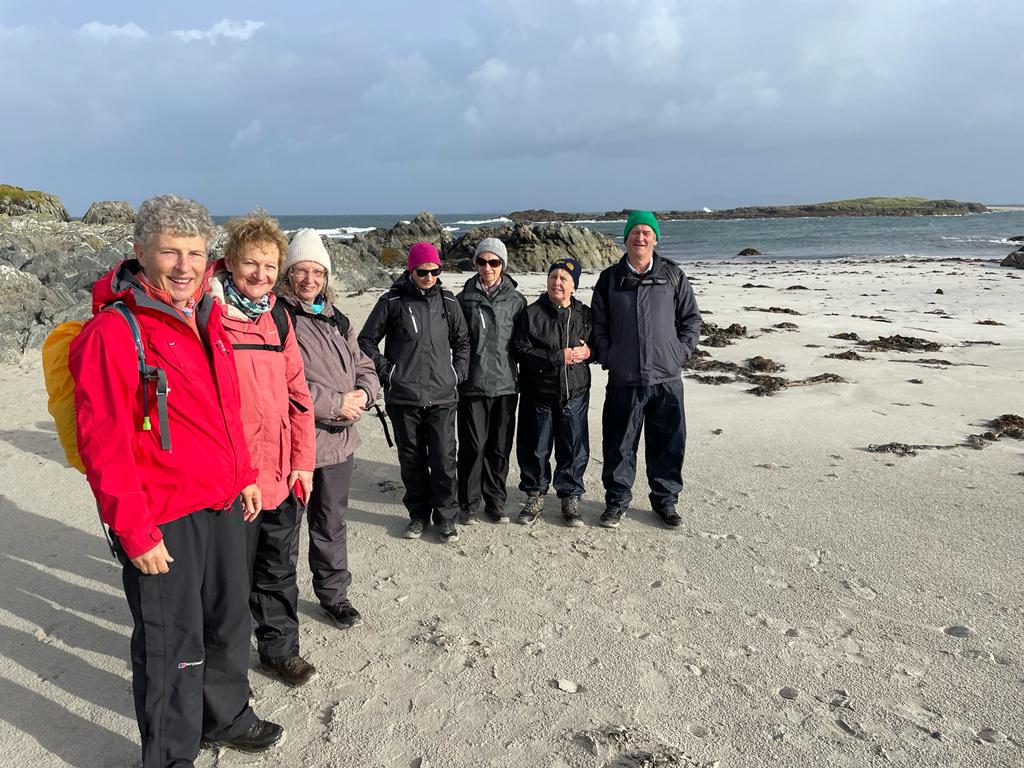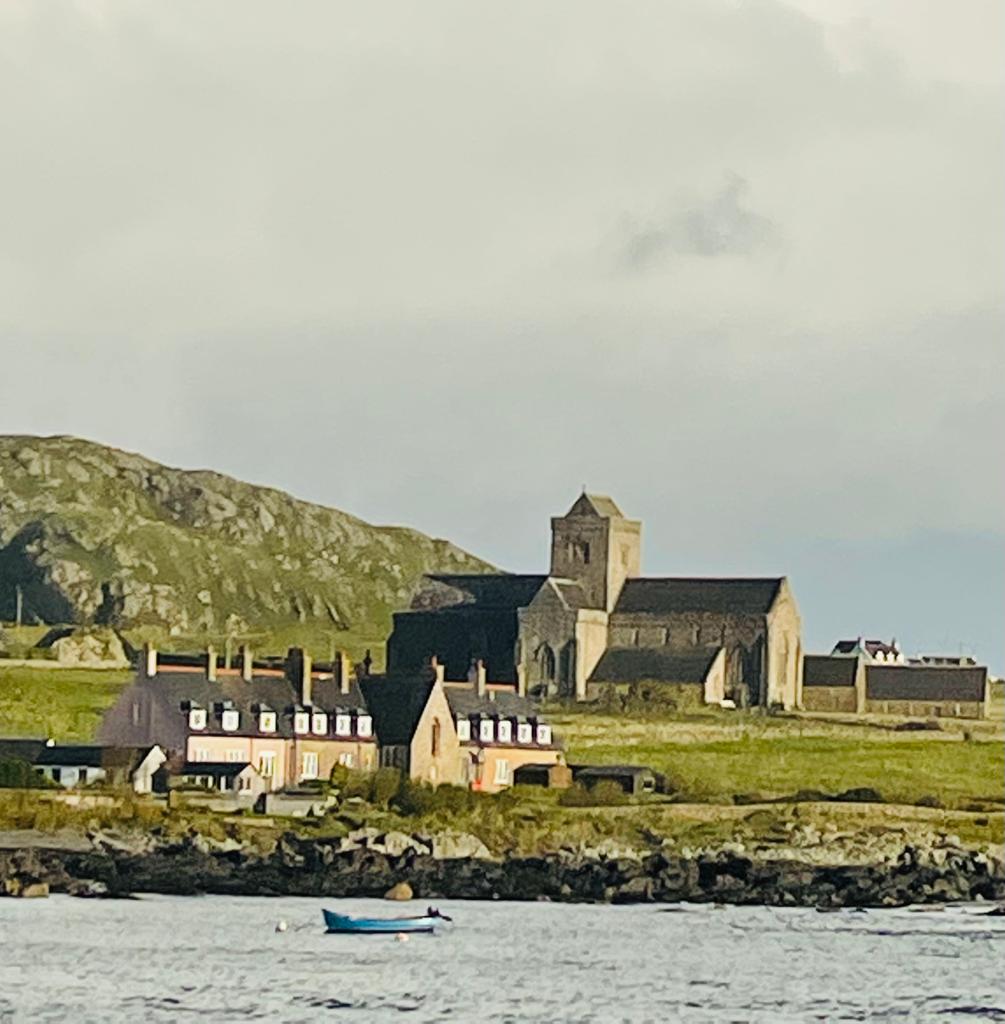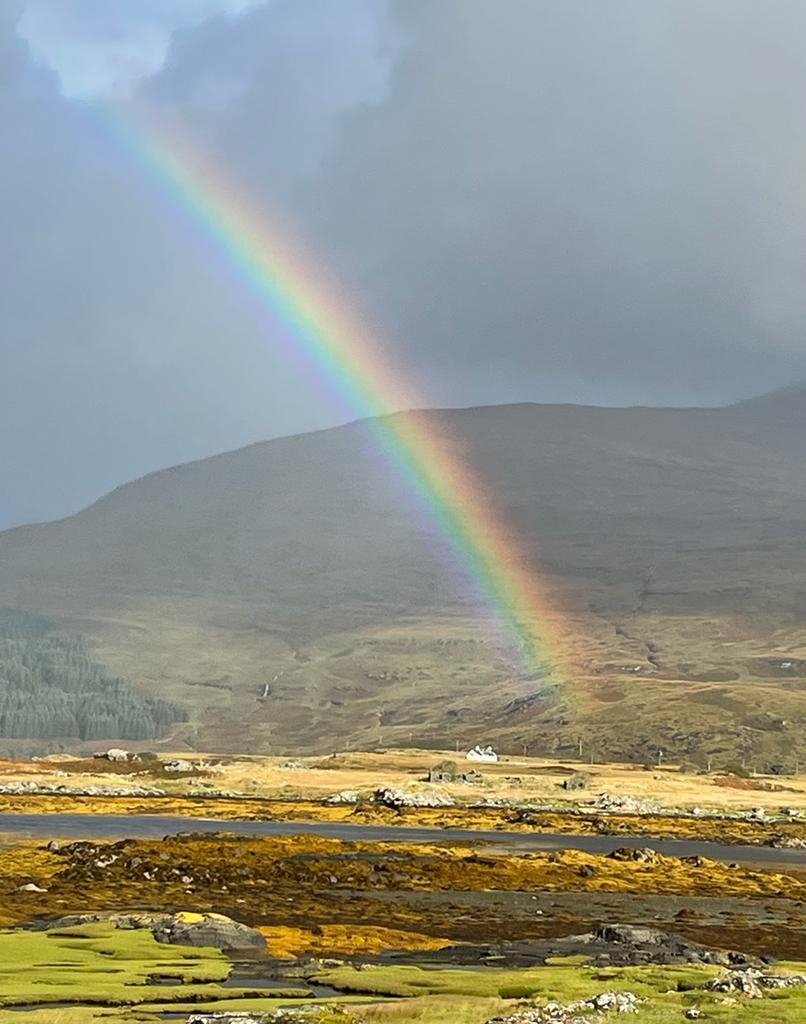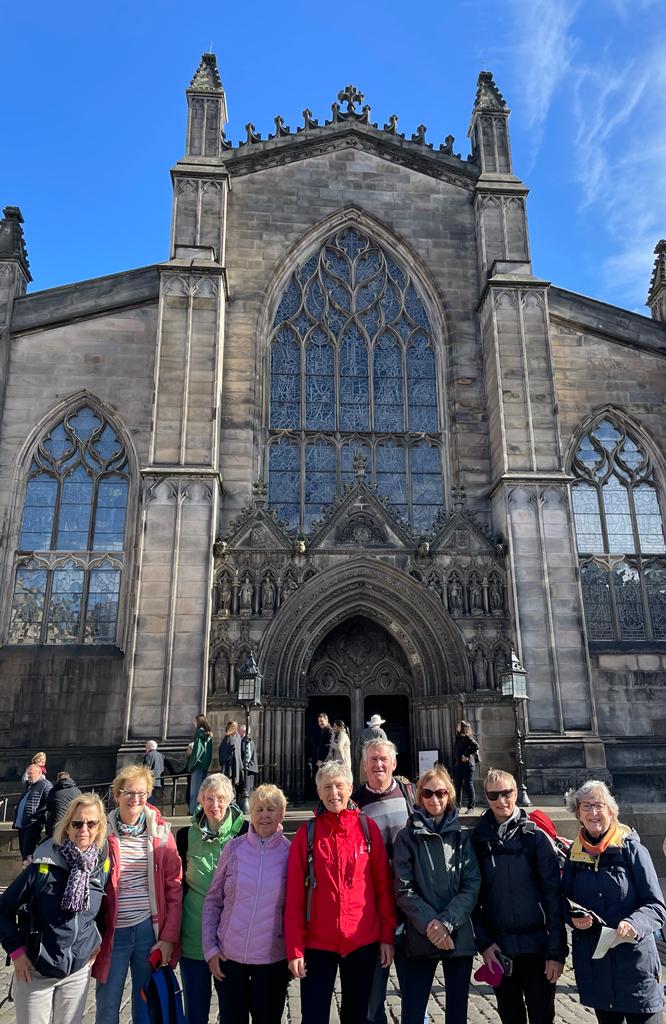
A Journey with St Columba
St Columba is one of Ireland’s three patron saints and what a character he seems to have
been. Born in Gartan in Co. Donegal in 521 he was baptised “Crimthann” by his family,
meaning “fox”. His mother had a dream that he would be a very special person and as time
went on, he became fondly known by his family & friends as Colum Cille (meaning dove of
the Church) and later his own monks simply called him Columba (the Latin word for Dove).
He seems to have been a very “human” saint, being quite open to admitting his failings as
well as his successes – really, a very normal guy….!!! The fact that he was born into the
Royal O’Neill clan in Donegal possibly made things harder for him as expectations would
naturally be high, or perhaps, moving within royal circles made his life easier – who knows.
What we do know as fact, is that while he was a pupil to St. Finnian at the famous Movilla
Abbey in Newtownards, Co. Down, he secretly copied some of St. Finnian’s book of
Scripture. (At that time, in the 6 th century, St. Finnian and Movilla Abbey was the only place
in Ireland with a complete copy of the Bible, giving the Abbey a renowned fame nationally &
a great reputation for education). When St. Finnian discovered that St. Columba had made
a copy of his precious Scriptures, understandably, he was angry & upset at the deceit. He
brought the matter to the High King of Ireland at the time – who made the famous ruling in
Ireland’s first copyright wrangle – “to every cow it’s calf, to every book it’s copy” so the copy
officially should belong to St. Finnian.
Upset by the outcome, St. Columba went back to his O’Neill clan and instigated a successful
rebellion between the O’Neill’s and the High King of Ireland in a very famous “Battle of the
Book” which took place in Drumcliffe, Co. Sligo. It is said that at least 3,000 people were
slain in this battle and St. Columba was filled with remorse. The Royal O’Neill clan at that
time were part of the famous Dalriada Kingdom which stretched across Ulster and the south
western region of Scotland, so Columba was encouraged to leave Ireland and travel to other
parts of the Kingdom to win as many souls to Christianity as had been lost in the Battle of
the Book. Columba set sail with 12 other dedicated followers, and when he reached the
island of Iona and satisfied himself that he could no longer see Ireland, he and his monks set
up a monastic settlement there. As we all know, St. Columba was instrumental in
converting many, many more than 3,000 souls to Christianity and Iona remains an incredibly
influential place of community and worship to this day.
So, on Oct 2nd - nine of us journeyed to Glasgow on a “Roaming Scotland” holiday to
discover what St Columba achieved after he left Ireland.
Our Guide and wonderful leader was Martin Haworth, who took us on a 5-day journey and
immersed us into an indoor and outdoor spiritual journey around the south western region
of Scotland. Leaving Glasgow Airport behind us, we drove to Loch Lomond where some
monks had set up a monastery on one of the Lochs many islands. There, we learnt about
Kessog who pre-dates St Columba in trying to introduce Christianity to this region of
Scotland. Kessog was born into the royal family of the King of Cashel in Munster, and once
ordained, was sent to the land of the “Scoti”, the Irish tribes who had made their home in
what is now Argyll, creating a kingdom which is known as Dalriada. Having met St. Patrick
before leaving Ireland, Kessog was obviously hugely influenced by him, and would have
been aware that the most favoured location for St. Patrick’s birth and youth was Old
Kilpatrick on the River Clyde, just 10 miles from Loch Lomond. We quickly became aware of
how the pieces of our jigsaw would slowly make sense as we continued our drive over the
magnificent “Rest and be thankful Pass” to reach our first accommodation in Ardfern on the
Argyll Peninsula. There we greeted a new member into our group – Alexa – as we enjoyed
some wonderful meals together, along with a lot of laughter, cheese sandwiches, bananas,
music and “craic”.
Over the next few days, Martin introduced us to some of the wonderful Churches and
ancient ruins throughout the south west of Scotland as he wove a wonderful vision of pagan
and Druidic worship leading into early Christianity which then brought us to an array of
Saints, Scholars, amazing characters and history. Thankfully, one of St Columba’s successors,
Adomnán, was so intrigued by what he heard of Columba, that he wrote one of the earliest
biographies of his life, leaving us with more factual information on St. Columba than we
have on most of our other early saints.
On our journey to reach our ultimate destination IONA, in torrential rain, we rescued a
pilgrim called Bianca from the roadside. We drove her to her destination for that night,
before continuing our own journey, thankful for the gift of a warm and comfortable
minibus, as she braved her pilgrimage completely by foot. Two days later she found some of
our group on Iona Island as she greeted them with “Oh my God you saved my life” by taking
her out of the rain, warming her up with laughter and leaving her to continue her journey in
a happier frame of mind.
We enjoyed so many experiences and so much fellowship throughout our time in Scotland,
in hidden Churches, during hillside picnics and wonderful evening meals. Throughout our
holiday 9 people laughed as never before and Martin joined us in this jovial outlook on life
once he realised “if you can’t beat them, join them”…!!!
Cheese sandwiches and bananas kept us all well fuelled as we reached the ferry to take us
to our ultimate destination on the evening of Day 3 - Iona Island (or as some American
clients of Martin’s once called it - Ten NA (10 NA))…!
Iona has been described as a “Thin Place” where heaven comes so close to earth. Our Guide
Martin, challenged us all to think on how this thin place brought spirituality to mind for each
of us as we considered heaven on earth. With Rev Phyllis and Janis leading us in a very
special private service in Iona Abbey on the theme of God’s creation, it helped all of us
contemplate the influence of “Thin Places” in our own lives. Everyone was fully aware of
how incredibly blessed we were to have the privilege of such a wonderful service in such a
glorious setting - huge thanks to both Reverend’s and also to Martin for his very thought
provoking reflection. Our own private service was in addition to the public worship we
enjoyed at 9pm in Iona Abbey both evenings - one evening being an EvenSong Service and
the next a Holy Communion service. Both different and both powerful and very thought
provoking. We were all touched by the community spirit on Iona and especially within the
Abbey community. This gentle and unobtrusive approach to life reflected our own feelings
within our own group as we enjoyed so much fellowship together leading to a different and
deeper approach to our own faith as we continued on our journey.
Perhaps it was the haggis, the changing weather, the wet luggage, the rainbows, the colours
of the trees, the wildlife, the peace everywhere we went along with stunning scenery or
simply the wealth of history and archaeology we were introduced to. Either way, our holiday
continued to help us face so many differing parts of human life together each day as
friendships deepened and new friendships formed.
One thing many of us became aware of during our holiday was the wealth of talent we were
exposed to while away and how useful a “party piece” can be. Perhaps it was a song by
Patricia, or that Indispensable man, or maybe hearing our Guide sing a wonderful song from
the Philippines or just having Rev Phyllis and Janis lead us in hymns - the combined talent
amongst us was amazing. We laughed and we cried as, throughout the whole holiday, a
smile remained on all our faces as we immersed ourselves into the spirituality that St
Columba and Iona bring to so many people in such a unique way.
We were fascinated by the similarities between Scottish and Irish Gaelic traditions and
language during our holiday - and yet why…??? After all, reaching back to the time of the
Dalriada kingdom the Irish were leading lights in paving the way to introducing Christianity
to this glorious part of the world and even managed to win over the Picts - a more barbaric
race of people from northern Scotland. In reading more of the place names around us, it
became clear that the two languages have many similar names, sounding almost the same
when said aloud but with slightly different spellings (eg Tarbert and Tarbet).
The people we met along the way were warm and friendly, eager to show their country to
us and extend their hospitality. The “open door policy” on Iona was so refreshing, as we
discovered the depth of honesty that is present there all the time within their community,
requiring little if any “security”. Wherever we went, we were warmly welcomed as we
eagerly chatted with everyone around us making our gentle and extremely jovial presence
felt wherever we went…!!
By the end of our holiday, we were all exhausted - not from walking or lack of sleep, but
from tears of laughter, tears of joy and tears as a party piece. We had started our journey in
the footsteps of St Columba not knowing what to expect and not knowing each other’s
idiosyncrasies. We left Scotland as 9 intricately woven individuals who became interwoven
in our mutual experiences as we each brought something incredibly special to this glorious
holiday. Like a Celtic knot - our memories are indelibly formed in our minds and a link
between us will remain forever.
“Just one more thing” - as “detective” Colombo might say…..
At the end of our holiday, we enjoyed one full day in Edinburgh, visiting the amazing St.
Giles Cathedral, as well as Edinburgh Castle. We were fascinated by the crowds (having
avoided them everywhere until we re-joined civilisation!!) and were serenaded by one
busker with a lovely song in both Gaelic & English which went …….
“Tourist, tourist, tourist attraction, if you don’t pay up I’ll put you in traction”…!!
At the end of our holiday, our rental car got a puncture leaving us with no option other than
to leave it in Budget & AA hands and complete our return journey to Glasgow by public
transport. By the time this happened, we had learnt, as St Columba did, that with a strong
faith in God, everything will always work out for the best - even if it’s not quite the way we
might have envisioned. Laughter, comradeship and a determined perseverance (similar
attributes to St Columba himself) brought us through our last challenge and left us all
refreshed to face life at home again.
WRITTEN BY LINDA WOODS.
TRALEE AND DINGLE UNION



